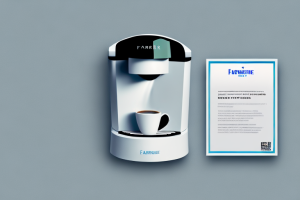Citric Acid For Cleaning Coffee Maker

A coffee maker being cleaned with citric acid
Coffee makers are an essential appliance in many households, providing a daily dose of caffeine that jumpstarts the day. However, frequent use of these devices can result in mineral buildup, affecting the taste and quality of your coffee. Fortunately, there’s a simple solution in the form of citric acid. In this article, we’ll discuss why citric acid is effective for cleaning coffee makers, how it removes mineral buildup, its benefits, and more.
Why Citric Acid is Effective for Cleaning Coffee Makers
Citric acid is a natural, gentle acid commonly found in citrus fruits like lemons and oranges. Its mild acidity makes it effective in removing mineral buildup in coffee makers without damaging the machine. Unlike harsh chemical cleaners, citric acid is non-toxic and eco-friendly, making it an ideal choice for those who prioritize green cleaning options.
In addition to its cleaning properties, citric acid also has the ability to enhance the flavor of coffee. When mineral buildup is left in a coffee maker, it can affect the taste of the coffee. By using citric acid to remove the buildup, the coffee maker can function properly and produce a better tasting cup of coffee. This is especially important for coffee enthusiasts who want to enjoy the full flavor of their coffee without any unwanted aftertaste.
How Does Citric Acid Remove Mineral Buildup in Coffee Makers?
Mineral buildup in coffee makers can cause clogs and affect the flavor of your coffee. Citric acid works by breaking down these mineral deposits, primarily calcium and magnesium, that accumulate over time. When heated with water, citric acid dissolves these minerals, allowing them to be flushed out and ensuring a clean coffee maker.
Citric acid is a common ingredient in many household cleaning products due to its effectiveness in removing mineral buildup. It is also a natural and environmentally friendly alternative to harsh chemicals. In addition to coffee makers, citric acid can be used to clean other appliances such as kettles, dishwashers, and washing machines. It is important to follow the manufacturer’s instructions and use citric acid in the recommended amounts to avoid damaging the appliance.
Benefits of Using Citric Acid to Clean Your Coffee Maker
Aside from being an effective and natural way to clean your coffee maker, using citric acid has other benefits as well. For one, it’s a cost-effective solution compared to commercial cleaning products. It’s also readily available in most grocery stores and online retailers, making it easily accessible. Additionally, citric acid is much safer to use than traditional cleaners that contain harmful chemicals that can be dangerous to your health and the environment.
Another benefit of using citric acid to clean your coffee maker is that it helps to remove mineral buildup that can affect the taste of your coffee. Over time, minerals from hard water can accumulate in your coffee maker and affect the flavor of your coffee. Citric acid helps to break down these mineral deposits and remove them from your coffee maker, resulting in a better-tasting cup of coffee.
Step-by-Step Guide on How to Clean Your Coffee Maker with Citric Acid
Cleaning your coffee maker with citric acid is a simple process that can be done in just a few easy steps:
- Fill the water chamber with a solution of one part citric acid and three parts water.
- Turn on the coffee maker and let it run through a brewing cycle.
- Discard the solution and rinse the water chamber with clean water.
- Repeat the process two to three times to ensure that all mineral deposits have been removed.
It is important to clean your coffee maker regularly to ensure that it continues to function properly and produce great-tasting coffee. Mineral deposits can build up over time and affect the flavor of your coffee, as well as the performance of your machine. Using citric acid is a safe and effective way to remove these deposits and keep your coffee maker in top condition.
Tips and Tricks for Maintaining a Clean Coffee Maker with Citric Acid
If you want to keep your coffee maker clean and running smoothly, here are some tips and tricks to help you do just that:
- Regularly clean your coffee maker with citric acid, ideally once a month, to prevent the buildup of mineral deposits.
- After cleaning with citric acid, run a brewing cycle with clean water to remove any remaining citric acid residue.
- Make sure to clean your coffee pot and filter regularly to prevent bacteria buildup and ensure the longevity of your coffee maker.
- If you live in an area with hard water, consider using filtered water when brewing coffee to prevent mineral buildup in the first place.
Another helpful tip for maintaining a clean coffee maker is to use a brush to clean the hard-to-reach areas, such as the crevices around the brewing basket and the spout. This will ensure that all areas of the coffee maker are thoroughly cleaned and prevent any buildup of coffee oils or residue. Additionally, if you notice any unusual smells or tastes in your coffee, it may be time to deep clean your coffee maker with a mixture of citric acid and water to remove any stubborn buildup.
Other Natural Cleaning Agents You Can Use to Clean Your Coffee Maker
Citric acid isn’t the only natural cleaning agent available for cleaning coffee makers. Other options include white vinegar, baking soda, and lemon juice. While all of these agents are effective, citric acid is the most gentle and has the least amount of residual odor.
White vinegar is a popular alternative to citric acid for cleaning coffee makers. It is a natural disinfectant and can effectively remove mineral buildup and coffee stains. To use white vinegar, mix equal parts vinegar and water and run the mixture through your coffee maker. Repeat the process with plain water to rinse out any remaining vinegar.
How Often Should You Clean Your Coffee Maker with Citric Acid?
To maintain a clean and functional coffee maker, it’s recommended that you clean it with citric acid once a month or more frequently if you use it daily. Regular cleaning helps prevent mineral buildup, which can affect the performance and taste of your coffee.
It’s important to note that if you have hard water, you may need to clean your coffee maker more frequently. Hard water contains high levels of minerals, such as calcium and magnesium, which can accumulate in your coffee maker and cause clogs. If you notice that your coffee maker is not functioning properly or your coffee tastes off, it may be time to clean it with citric acid.
Common Mistakes to Avoid When Cleaning Your Coffee Maker with Citric Acid
While cleaning your coffee maker with citric acid is a simple process, there are some common mistakes to avoid:
- Always dilute the citric acid solution with water. Using undiluted citric acid can cause damage to your coffee maker and potentially harm you.
- Don’t leave the citric acid solution in your coffee maker for an extended period as it can corrode the machine’s internal parts.
- Make sure to rinse your coffee maker thoroughly with clean water after cleaning with citric acid to prevent any residual acid from affecting the taste of your coffee.
It’s important to note that citric acid should not be used to clean coffee makers made of aluminum or other non-stainless steel materials. Citric acid can react with these materials and cause discoloration or damage to the coffee maker. Always check the manufacturer’s instructions before using citric acid to clean your coffee maker.
Is Citric Acid Safe for Your Health and the Environment?
Citric acid is generally considered safe for human consumption and use. It’s also an eco-friendly choice compared to traditional cleaning products that contain harsh chemicals. However, as with all cleaning agents, citric acid should be handled with care and kept out of reach of children and pets.
In conclusion, citric acid is an effective and natural way to clean your coffee maker. It’s safe to use, readily available, and cost-effective. By following the steps and tips outlined in this article, you’ll be able to maintain a clean and functional coffee maker that produces great-tasting coffee every time.
It’s worth noting that citric acid is not only useful for cleaning coffee makers, but it also has a variety of other applications. For example, it’s commonly used as a natural preservative in food and beverages, as well as in cosmetics and personal care products. Additionally, citric acid is a key ingredient in many pharmaceuticals and medical treatments. Overall, citric acid is a versatile and safe substance that has many practical uses in our daily lives.



